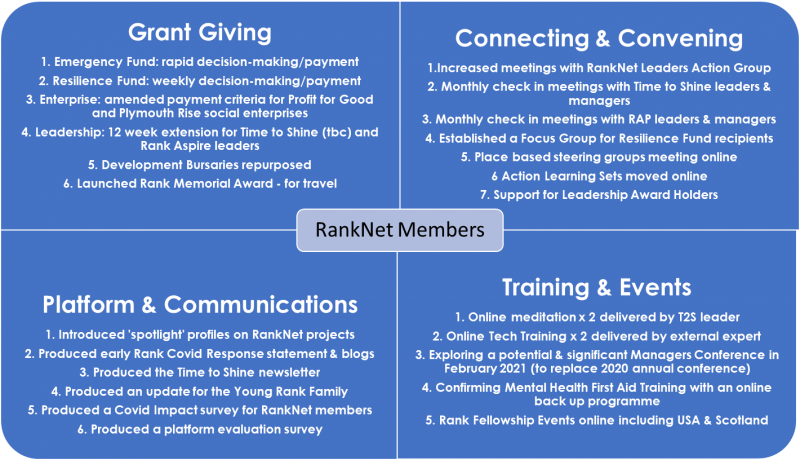Nearly one-third of lower-paid employees have lost jobs or been furloughed, compared to less than one-in-ten top earners: in numerical terms that is around 7 million jobs overall. The Resolution Foundation reports ‘significant anxiety’ amongst those furloughed as to immediate and future prospects, especially as furloughing is likely to obscure or hide future job losses. On this we might not see a clear picture until the year end.
About one million under 25s hit the labour market for the first time each year, mostly in the third quarter, and it unlikely that we will see any significant economic recovery before then. Given the predicted degree of economic contraction, there is little doubt that the young will bear the heaviest burden of this post pandemic recovery. With an extra 600,000 young people likely to be added to existing unemployment figures in the coming year, the challenge for the young is likely to eclipse those experiences of 2008: we are mindful that Rank’s exemplar leadership programme, Time to Shine, emerged from the rubble of the financial crash nearly 12 years ago.
Why do we mention this? Because Rank’s long standing interest in challenging inequality, especially around issues of social mobility and the emphasis we have placed on encouraging and supporting a generation of young, enterprising leaders is not likely to disappear. We might frame it differently, but we sense the need for greater focus and to ensure that our resources are maximised to greater effect.
As an ‘engaged’ funder the Foundation has concentrated on meeting the needs of its 450 strong network of organisations: ‘RankNet’ has grown steadily over recent years. If you are funded by Rank, then, by definition, you are part of the network and, through this, you have access to a range of funds, activities and support.
Governed by an elected group of ‘social leaders’, working closely with the Rank executive, we have been operating two funds for the last 8 weeks: an Emergency Fund (for small capital or training needs) and the uncapped Resilience Fund, created for those in the network experiencing immediate shortfalls in planned income, especially around meeting cashflow needs. Both of these operate with a short turnaround – anything considered by the weekly Resilience Fund committee is paid a few days later.
Through both of these funds, we have made 107 grants and supported 88 organisations. What is interesting, especially regarding the Resilience Fund applications, is that the size of the respective ask has been relatively modest with an average request of around £16K, perhaps reflecting the respect and understanding gained through existing relationships?
We have also followed up with 15 of those organisations recently supported, to assess the immediate impact of our grant whilst trying to better understand the complexities and significance of their respective challenges, and how we might better help going forward. But there is no doubt as to the significance of the uncertainty felt amongst our RankNet leaders, where for some the real crunch might not be felt for another 6 – 12 months.
The Rank team has also been busy managing the wider needs of our network including supporting our various leaders (including those furloughed) as part of our Time to Shine (T2S) or Rank Aspire Programme (RAP) and the Leadership Award holders. Part of this is the decision to consider extending those on our current schemes, where applicable, not just because of the upheaval caused by the pandemic but mindful of the challenges of leaving these schemes at a time when new job opportunities will be severely limited.
Adapting quickly to ‘remote’ working has ensured that we have been able to continue with much of our routine support of the network including the management of our place-based and social enterprise programmes. Across the network, we have run nearly 60 ‘Zoom’ events for some 550 people since lockdown. We have been struck by how responsive our members have been, building on the strength of strong networks and a mutual understanding on how powerful collaboration and partnerships can be.
The coordinated effort to help feed the most impoverished and the most vulnerable in Dundee, has been led, for most part, by a Rank funded coalition. As we look across RankNet, we have been overwhelmed by stories of exceptional practice, of innovation and, above all, of strong, community centred leadership: this is what we see as ‘engaged philanthropy’ in action. But ‘food poverty’ is but one strand of many, from digital poverty to poverty of opportunity, especially regarding the young, where other issues around mental health and well-being will sharpen our focus over the coming months.
What next? Mindful that the dust is yet to settle, we will look to ensure that the Foundation is well set to meet these emerging challenges, deepening our understanding of the opportunities this engaged, focused approach can bring. But more than ever, Rank is willing to collaborate and share with our partners, both within and outside of our network and across the various sectors, as the challenge to ‘reset, recover, rebuild and renew’ begins.

David Sanderson, CEO, The Rank Foundation
